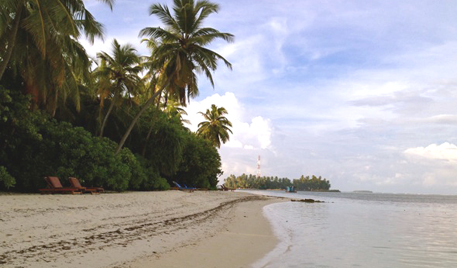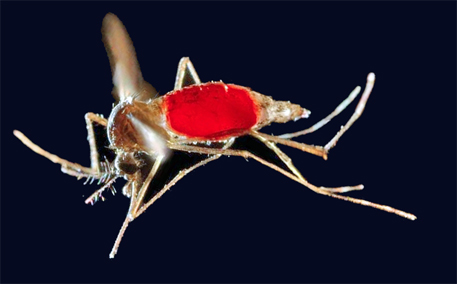Travel article No 2
I do feel foolish not to have
To avoid taking away anything less pleasant perhaps they should also provide visitors with some balanced information about the risk of dengue fever and reassure them with helpful tips on how they can protect themselves. Also from Ken’s archive: For more blogs from Ken on fundraising and communication click here.
|
The Oxford English dictionary defines dengue fever (pronounced den-gay) as a debilitating viral disease of the tropics, transmitted by mosquitoes, and causing sudden fever and acute pains in the joints. Now I’ve had it I don’t feel that does it justice. When I finally surfaced after several days I wrote the following description of how it seemed to me at the time, on the pad I keep by my bed.
Melodramatic, perhaps (I was delirious for about 10 days) but dengue fever is not unlike this, believe me. I’ve had e coli poisoning (flown back from Tanzania), flu (way worse than a cold, the real thing is) and countless other bugs so I’m no stranger to sudden viral infection. All fevers are disorientating but dengue seemed orders of magnitude worse, way more intense, nauseating, painful and itchy. Movement is anathema. Your flesh creeps and the itching lasts longer than anything except the despair and fatigue. Not for nothing is dengue known as breakbone fever – every bone hurts, mostly back and arms. If there are worse bugs in store then I’m for staying at home. So it seems strange that something so cataclysmic could come as such a complete surprise. Of course my health is my responsibility and travelling in exotic parts has always had its risks. The Calcutta quickstep or the Thai tango are part and parcel of the lure of the Orient (though they rarely floor you for weeks on end). As a seasoned traveller I do feel foolish not to have taken simple precautions. I could have searched online before leaving. It’s there. But to do that I would have had to know what to look for. When we updated our jabs we mentioned our destination to the doctor but were told only that there’s no malaria in the Maldives. Dengue wasn’t mentioned. Though they trumpet the absence of malaria, dengue fever doesn’t merit mention in all the material issued by the travel company – Trailfinders – or by the resort. Would it not be helpful, even as a precaution, for resorts and travel agents to explain about it and to list what the traveller should do? There is no antidote, the only way to avoid dengue is not to be bitten. Still travellers can do a lot to protect themselves. They can liberally cover themselves with appropriate insect repellents, keep their mosquito nets, doors and windows closed and ensure that their resort thoroughly ‘fogs’ for mosquitoes to control their spread. According to Trailfinders, mine is the first case of dengue fever ever reported to them. And it’s just ‘one of many illnesses found in that part of the world, including the Maldives’. In other words, ‘tough luck sunshine’. Yet the World Health Organisation (WHO) reported and documented an outbreak of dengue in the Maldives in 2011 involving 2,234 cases and 12 deaths. The Red Cross report on this ‘epidemic’ cites cases from 44 islands and some resorts. On 6th November this year The New York Times reported an epidemic of dengue sweeping near neighbour India and a too-slow and inadequate response from the authorities. ‘India’, it says, ‘has become the focal point for a mosquito-borne plague that is sweeping the globe. Reported in just a handful of countries in the 1950s, dengue is now endemic in half the world’s nations.’ Dengue is also currently reported in Madeira, Mexico, Florida, Thailand and it’s not uncommon in the Caribbean. Trailfinders’ Customer Care Manager Bob Samuel confessed complete ignorance of any of the above and told me, ‘Anyway it’s not our business. We’re a travel company, not a medical adviser.’ We won’t be using Trailfinders again. I may have been very unlucky. The risk for tourists may be small, though any risk is scary (anyone not scared of dengue is almost certainly unaware of it). But my experience and others I’ve heard from since shows there’s definitely a risk. A correspondent from Durham whose wife was infected with dengue fever in the Maldives a few weeks ago made the following points.
The Australian Government warns its citizens about the risk of dengue fever in the Maldives. Right now India’s health experts admit their dengue fever epidemic is threatening hundreds of millions of people not just in India but around the world. Yet British tourists aren’t routinely warned of it or advised what they can do. Websites promoting the resort where I was bitten cheerfully proclaim the holiday of a lifetime. ‘Welcome to Medhufushi’, they say, ‘a naturally quiet, serene, authentic Maldivian island. After a short seaplane journey, step onto the white sandy beaches, which are surrounded by a crystal clear lagoon. Our staff are here to tend to your every need and we are confident that after your stay you will take away memories of a truly tropical paradise.’ To avoid taking away anything less pleasant perhaps they should also provide visitors with some balanced information about the risk of dengue fever and reassure them with helpful tips on how they can protect themselves. At the very least they could add, ‘don’t forget to bring strong insect repellent. And spray it all over, every day, several times each day.’ Or they could advise tourists to bury their heads in the sand, and hope. © Ken Burnett 2012
|
Disagree with me? Or agree? If you’ve anything to add, have your say here. Email your thoughts or comments now to me and providing they’re relevant and appropriate I’ll put them on the site. Sign up here for more OPINIONS coming soon
Ken Burnett is a director of Clayton Burnett Limited, The White Lion Press Limited and he’s a former chairman of the board of trustees at the international development charity ActionAid. He’s author of several books including Relationship Fundraising and The Zen of Fundraising and is managing trustee of SOFII, The Showcase of Fundraising Innovation and Inspiration. For more on Ken’s books please click here.
|









